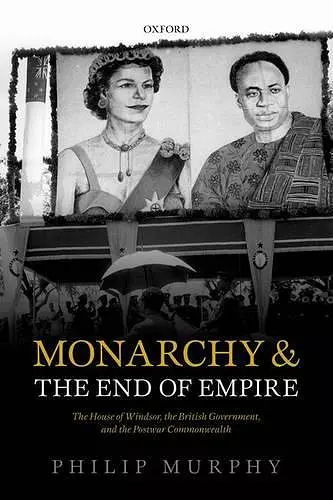Monarchy and the End of Empire
The House of Windsor, the British Government, and the Postwar Commonwealth
Format:Paperback
Publisher:Oxford University Press
Published:12th Nov '15
Currently unavailable, and unfortunately no date known when it will be back
This paperback is available in another edition too:
- Hardback£105.00(9780199214235)

This unique and meticulously-researched study examines the triangular relationship between the British government, the Palace, and the modern Commonwealth since 1945. It has two principal areas of focus: the monarch's role as sovereign of a series of Commonwealth Realms, and quite separately as head of the Commonwealth. It traces how, in the early part of the twentieth century, the British government promoted the Crown as a counterbalance to the centrifugal forces that were drawing the Empire apart. Ultimately, however, with newly-independent India's determination to become a republic in the late 1940s, Britain had to accept that allegiance to the Crown could no longer be the common factor binding the Commonwealth together. It therefore devised the notion of the headship of the Commonwealth as a means of enabling a republican India 'to continue to give the monarchy a pivotal symbolic role and therefore to remain in the Commonwealth.' In the years of rapid decolonization which followed 1945, it became clear that this elaborate constitutional infrastructure posed significant problems for British foreign policy. The system of Commonwealth Realms was a recipe for confusion and misunderstanding. Policy makers in the UK increasingly saw it as a liability in terms of Britain's relations with its former colonies, so much so that by the early 1960s they actively sought to persuade African nationalist leaders to adopt republican constitutions on independence. The headship of the Commonwealth also became a cause for concern, partly because it offered opportunities for the monarch to act without ministerial advice, and partly because it tended to tie the British government to what many within the UK had begun to regard as a largely redundant institution. Philip Murphy employs a large amount of previously-unpublished documentary evidence to argue that the monarchy's relationship with the Commonwealth, which was initially promoted by the UK as a means of strengthening Imperial ties, increasingly became an source of frustration for British foreign policy makers.
Professor Murphy's book by a country mile the most important and well-informed to have been written about the contemporary British monarchy * Peter Oborne, The Telegraph *
a carefully researched and beautifully presented book that chronicles the relationship between the monarchy, the UK government, and the decolonisation of the British Empire * Ruth Craggs, Reviews in History *
Philip Murphy's book makes a strong case for the importance of analysing the role, self-image, and global perception of the monarchy in any book about British politics or foreign policy in the twentieth century ... an interesting, well-written, and extremely important contribution to the fields of British royal, political, imperial, and commonwealth history. * Charlotte Lydia Riley, 20th Century British History *
splendid * Peter Boyce, American Historical Review *
This is a solidly researched and well-argued book on a neglected subject that has the additional virtue of being entertaining. It deserves a wide readership. * Wm. Roger Louis, English Historical Review *
Monarchy and the End of Empire is a traditional political study that examines in detail the dynamic relationships between and among the palace, Whitehall, and Commonwealth governments. This political focus is its greatest strength, as Murphy researches and writes this kind of history exceedingly well ... Murphy has thus provided not only a monograph that enriches and gives texture to our understanding of monarchy and Commonwealth but also one that demonstrates a need for more work on these topics, if we are to ever fully understand the process and results of decolonization. * Charles V. Reed, H-Albion *
ISBN: 9780198757696
Dimensions: 235mm x 159mm x 15mm
Weight: 422g
258 pages